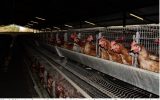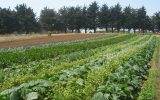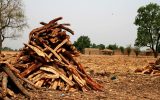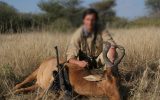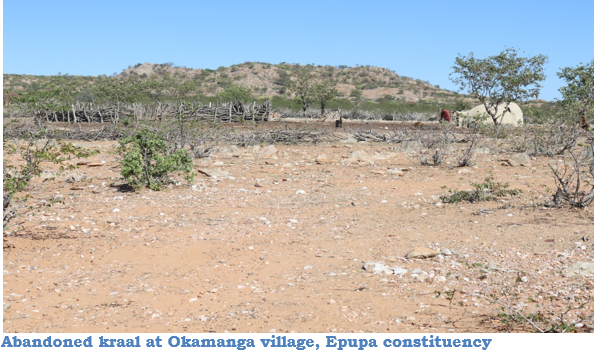As for the past consecutive seven (7) years, Kunene region has been experiencing severe drought. The effects of the drought is known to have span throughout the seven constituencies. The region is known to have only recorded sporadic rainfall, leaving some parts of the region with few spotted pastures. The persistent drought have significantly affected both human and livestock.
As a result of the on-going drought; the governor of Kunene region, Hon. Marius Sheya initiated a trip comprising of various stakeholders to assess the extent of drought effect in the region. The assessment was carried out in May, comprising of 34 officials from different government and non-governmental institutions. The trip was conducted over a period of eight days.
Based on the assessment carried out, it have been revealed that the effect of drought has led to high mortality rate of livestock. This has significantly reduced the population of both large and small stock in the region. With the region known for livestock farming, the reduction in livestock population has negatively affected the livelihood of most of the inhabitants. Some community members have been forced to relocate their families in search of better grazing.
The situation is further known to have gotten worse earlier this year, when majority of farmers migrated from other parts of the region to the central and eastern parts in search of better grazing.
During this period, the government is known to have intervened by providing drought relief food and fodder for livestock. Epupa, Opuwo rural, Opuwo urban, Sesfontein and Khorixas are some of the constituencies that are known to have benefited from the drought relief fund. The process of distributing drought relief items however, encountered some challenges such as; limited suitable transport and facing some difficult terrains.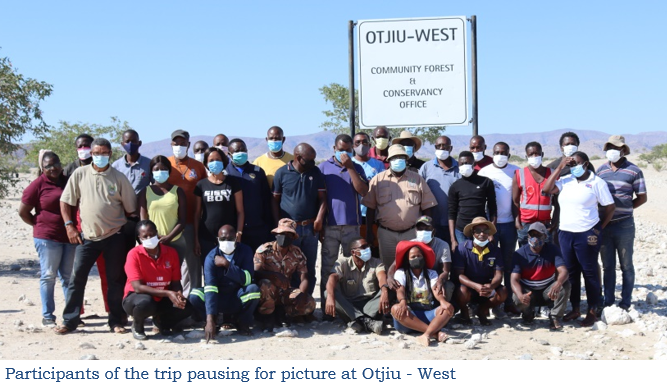
It has been revealed that, most of the areas visited during the trip assessment had very poor grazing with some areas completely having no grass while others with little grass. The little grass is attributed to have germinated as a result of the sporadic rain showers received earlier in March this year.
The assessment team also learnt that some communities were experiencing increased conflicts with wildlife, a situation attributed to the prolonged drought effect. Some of the affected areas include Bersig, Palmwag, Sesfontein, Omuramba and Deriet where elephants continuously ravaged gardens and damaged water points.
During the trip, very few livestock were spotted. An indication that most animals died or were relocated to other areas with better grazing mainly the Eastern parts of the region and the neighboring regions like Omusati. The participants also observed many carcasses of livestock mostly cattle along many roads especially in Orupembe and Otjinungua.
The relocation of livestock has negatively affected the livelihood of the inhabitants, more especially the school going children as they were forced to leave school and relocate with parents. During the trip assessment, the team observed many abandoned houses in most visited areas. According to locals spoken to; people have relocated due to for the following reasons: firstly, to access areas with better grazing for their livestock and secondly, to access areas with water as boreholes dried up due to the persistent drought.
While some farmers opt to relocate for better pastures, others developed coping strategies to live with drought. Such coping strategies include initiation of farming with dry crops and irrigated crops along the Kunene River. Others resorted to eating wild fruits due to lack of food, such as the community members at Serra Cafema . The team observed a number of farmers growing dry land crops mainly pearl millet (mahangu) and preparing land for irrigated crops, such as tomatoes and maize. The crop cultivation activities were observed at the villages along the Kunene river, namely; Okozongombe, Otjamaungu, Otjimuhaka, Enjandi, Omungurura, etc all in Epupa constituency.
In total, 34 officials from different government and non-governmental institutions participated in the trip. The participants represented the following institutions: Office of the President, Office of the Governor, Kunene Regional Council, NAMPOL, Ministry of Home Affairs, Immigration, Safety and Security, Ministry of Health and Social Services, Ministry of Information and Communication Technology, Ministry of Education, Arts and Culture, Ministry Gender Equality, Poverty Eradication and Social Welfare, Namibia Red Cross Society, Namibia National Farmers Union (NNFU), Welwitchia Farmers Union and Ngatuuane Farmers Union.





